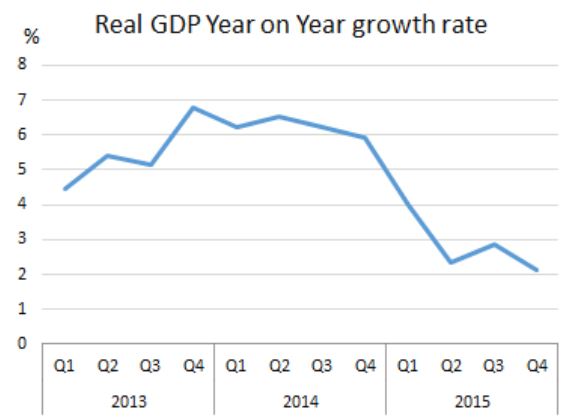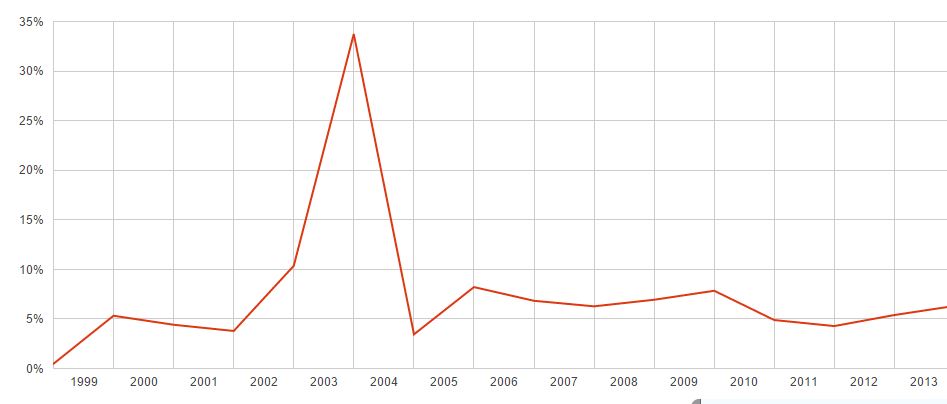[caption id="attachment_1768" align="alignnone" width="2302"] President Buhari travelling [/caption]
President Buhari travelling [/caption]
There is general disenchantment in the land as the Buhari administration has sufficiently demonstrated a total lack of idea on how to run our economy to attain its full potentials at this time. This fact is further strengthened by the shambolic and embarrassing preparation of a simple budget that is a normal ritual of governments all over the world
President Buhari now lives and works on air despite promises of being prudent with the dwindling Crude oil Resources of Nigeria. Most are Aware of the fact that, in the run-up to the 2015 presidential election, leaders and APC members were very expressive in condemning the president of the country, President Goodluck Jonathan, for each step he took
The gross domestic product (GDP) growth rate of Africa’s largest economy, Nigeria, has fallen to a 16-year low of 2.815 percent – the lowest since the return of democracy in 1999. According to the World Bank, Nigeria’s GDP growth rate for 1999 stood at 0.47 percent and peaked in 2004 at 33.7 percent, growing at an average of six percent from 2005 to 2013.
However, the Nigerian Bureau of Statistics (NBS) GDP report released on Tuesday shows that the GDP growth rate sunk to its lowest since the beginning of the fourth republic – lower than World Bank projections for 2015. According to the report, issued by Yemi Kale (pictured), statistician-general of the federation, the fourth quarter GDP grew by 2.11 percent, lower than every other quarter in the 2015 – and it is the lowest from 2013 to 2015 as shown in graph below:

“In the fourth quarter of 2015, the nation’s Gross Domestic Product (GDP) grew by 2.11% (year-on-year) in real terms,” the report read. “This was lower by 0.73% points from growth recorded in the preceding quarter and also lower by 3.83% points from growth recorded in the corresponding quarter of 2014. “Quarter on quarter, real GDP increased by 3.10% during the quarter, aggregate GDP stood at N25,930,469.41 million (in nominal terms) at basic prices. Compared to the Fourth Quarter 2014 value of N24,205,863.34 million, nominal GDP was 7.12% higher. “Nominal GDP growth was also higher relative to growth recorded in Q3 of 2015 by 1.11% points.” On the bright side, however, the non-oil sector contributed more to the nation’s GDP than the oil sector, which contributed only 8.06 percent. “As a share of the economy, the Oil sector contributed 8.06% of total real GDP, down from figures recorded in the corresponding period of 2014 and in Q3 of 2015 by 0.91% points and 2.21% points respectively. “Growth in the non-oil sector was largely driven by the activities of trade, crop production, and information and communication, other services and real estate. “The non-oil sector grew by 3.14% in real terms in Q4 of 2015.
This was 0.08% points higher from Q3 of 2015, yet 3.30% points lower from the corresponding quarter in 2014. “In real terms, the Non-Oil sector contributed 91.94% to the nation’s GDP, higher from shares recorded in Q3 of 2015 (89.73%) and Q4 of 2014 (91.03%).” According to the report, more than 75 percent of all the major economic sectors experienced a decline in the fourth quarter of 2015.

GDP growth by year, according to the World Bank and NBS, since the return of democracy: 2000 (5.32%) 2001 (4.41) 2002 (3.78) 2003 (10.35) 2004 (33.74) 2005 (3.44) 2006 (8.21) 2007 (6.83) 2008 (6.27) 2009 (6.93) 2010 (7.84), 2014 (6.23), 2015 (2.82).
source @ TheCable
 President Buhari travelling [/caption]
President Buhari travelling [/caption]The Buhari economy is at a total halt! No profitable economic activity going on anywhere. Infrastructural development that characterised Goodluck Jonathan’s administration has since been brought to a stop; our elevated agricultural sector is now in a fast reverse course.
There is general disenchantment in the land as the Buhari administration has sufficiently demonstrated a total lack of idea on how to run our economy to attain its full potentials at this time. This fact is further strengthened by the shambolic and embarrassing preparation of a simple budget that is a normal ritual of governments all over the world
President Buhari now lives and works on air despite promises of being prudent with the dwindling Crude oil Resources of Nigeria. Most are Aware of the fact that, in the run-up to the 2015 presidential election, leaders and APC members were very expressive in condemning the president of the country, President Goodluck Jonathan, for each step he took
The gross domestic product (GDP) growth rate of Africa’s largest economy, Nigeria, has fallen to a 16-year low of 2.815 percent – the lowest since the return of democracy in 1999. According to the World Bank, Nigeria’s GDP growth rate for 1999 stood at 0.47 percent and peaked in 2004 at 33.7 percent, growing at an average of six percent from 2005 to 2013.
However, the Nigerian Bureau of Statistics (NBS) GDP report released on Tuesday shows that the GDP growth rate sunk to its lowest since the beginning of the fourth republic – lower than World Bank projections for 2015. According to the report, issued by Yemi Kale (pictured), statistician-general of the federation, the fourth quarter GDP grew by 2.11 percent, lower than every other quarter in the 2015 – and it is the lowest from 2013 to 2015 as shown in graph below:

“In the fourth quarter of 2015, the nation’s Gross Domestic Product (GDP) grew by 2.11% (year-on-year) in real terms,” the report read. “This was lower by 0.73% points from growth recorded in the preceding quarter and also lower by 3.83% points from growth recorded in the corresponding quarter of 2014. “Quarter on quarter, real GDP increased by 3.10% during the quarter, aggregate GDP stood at N25,930,469.41 million (in nominal terms) at basic prices. Compared to the Fourth Quarter 2014 value of N24,205,863.34 million, nominal GDP was 7.12% higher. “Nominal GDP growth was also higher relative to growth recorded in Q3 of 2015 by 1.11% points.” On the bright side, however, the non-oil sector contributed more to the nation’s GDP than the oil sector, which contributed only 8.06 percent. “As a share of the economy, the Oil sector contributed 8.06% of total real GDP, down from figures recorded in the corresponding period of 2014 and in Q3 of 2015 by 0.91% points and 2.21% points respectively. “Growth in the non-oil sector was largely driven by the activities of trade, crop production, and information and communication, other services and real estate. “The non-oil sector grew by 3.14% in real terms in Q4 of 2015.
This was 0.08% points higher from Q3 of 2015, yet 3.30% points lower from the corresponding quarter in 2014. “In real terms, the Non-Oil sector contributed 91.94% to the nation’s GDP, higher from shares recorded in Q3 of 2015 (89.73%) and Q4 of 2014 (91.03%).” According to the report, more than 75 percent of all the major economic sectors experienced a decline in the fourth quarter of 2015.

GDP growth by year, according to the World Bank and NBS, since the return of democracy: 2000 (5.32%) 2001 (4.41) 2002 (3.78) 2003 (10.35) 2004 (33.74) 2005 (3.44) 2006 (8.21) 2007 (6.83) 2008 (6.27) 2009 (6.93) 2010 (7.84), 2014 (6.23), 2015 (2.82).
source @ TheCable



l taught his waz the best wat ever u sow u will reap it is really pathetic that things are really gone bad, no work, money.
ReplyDeleteyou people should keep deceiving your selves just because i don't like the man ...... therefore, write to raise hatred against him..... whereas, your lack of investigative journalism had brought the nation to her kneels before darkness...... today u praise Jonathan whom u disdain yesterday. you wrote the corruption that ruined the Nigerian mind.... will God not judge u?
ReplyDeletei meant just because you don't like the man.....of course I like Buhari despict ...blackmailing post like this in sites like this.
ReplyDelete